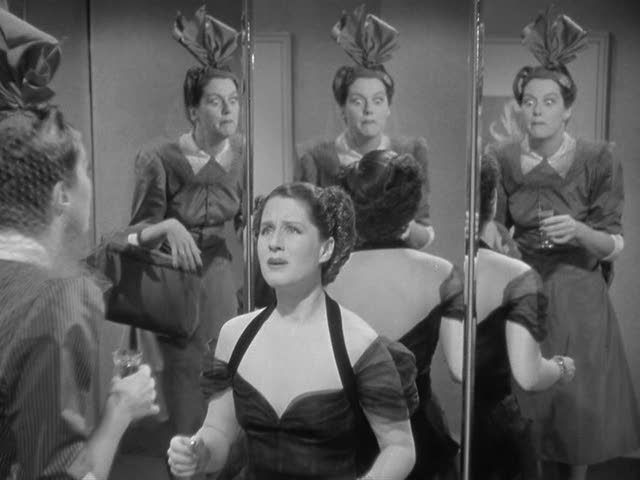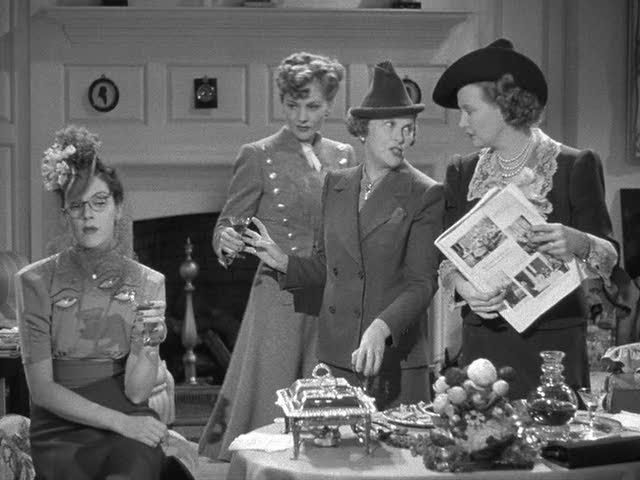
George Cukor's The Women is an overwrought, bitchy melodrama in which, true to its title, the male presence is entirely eliminated in order to focus on the gossip, backbiting, betrayals, and catfights that go on among a group of society women. The film, adapted from a successful play, is a deliberately high camp satire. With its ripe, hilariously barbed dialogue, it perfectly captures a certain kind of shrill, endlessly chattering upper-class milieu, with women so isolated from their husbands and the male world in general that the men in their lives need not even appear in the film. Cukor went to great lengths to ensure that there was no male representation onscreen, even casting female animals for the scenes where dogs, horses, and monkeys appear.
The film's plot, based on a real piece of gossip overheard by playwright Clare Boothe Luce, centers on Mary Haines (Norma Shearer), who initially seems to be the only person in town who doesn't know that her husband Stephen is running around on her with the wily, man-stealing shopgirl Crystal Allen (Joan Crawford). All of Mary's supposed friends express fake sympathy, while eagerly spreading the news far and wide, none of them more than the cheerfully gossipy Sylvia Fowler (Rosalind Russell, in an amazing comic turn). Indeed, Mary is surrounded by these gossiping women, virtually a who's who of female MGM talent at the time the film was made: the nosy Edith (Phyllis Povah), naïve young Peggy (Joan Fontaine), the brash four-time divorcee Countess de Lave (Mary Boland), and the foxy former chorus girl Miriam (Paulette Goddard), a more benign man-stealer than the blatantly gold-digging Crystal. The cast is, obviously, top-notch, and they're given a lot of red meat to dig into. The script is hilarious, packed with memorably bitchy lines and patter, as all these women trade barely concealed barbs, openly insulting one another while maintaining at least an appearance of decorum and manners.
Only Crystal herself, with her lower-class background, is crass enough to let the veil slip aside, and her quips are more unfettered than those of the other women. When Mary, having finally learned about the affair, confronts Crystal and insults her taste in clothes, Crystal retorts without missing a beat, "Thanks for the tip, but when anything I wear doesn't please Stephen, I take it off." Crawford doesn't get as much screentime as one would expect to justify her top billing — she can't be onscreen for more than a half hour total — but she makes the most of what she gets, delivering frankly sexual lines like that with a raised eyebrow and a lewd leer. Later, she's the only character in the film to get as close as the Production Code would allow to calling another woman a bitch, when she not so subtly references a word that "isn't used in high society... outside of a kennel."

Cukor and the cast have an obvious ball with this lurid material, and whenever the cattiness of the women is the focus, the film crackles with energy. Cukor's camera groups the women into tight clusters, documenting their warm, friendly manner, their propensity to hug and smile and laugh together, even as their dialogue cloaks venom in a sweet, light coating of sugar. At other times, the film often lapses into over-the-top sentimentality, especially with regards to Mary, who is devastated by learning that her husband — who she thought of as an equal and a partner — is cheating on her. There's more than a hint of anti-feminist ideology in the script, which positions Mary as a proto-feminist figure who takes pride in her ability to fish and ride horses as well as her husband, and who engages in friendly competition with him over such manly pursuits. The implication is that it's only natural for the never-seen Stephen to seek out the arms of another woman, since Crystal offers him only sex and uncompetitive femininity. In the end, Mary becomes happy only when she's able to sacrifice her pride and accept her husband back, for the first time using the catty ways of her friends to win him back.
The film also falters whenever it indulges the over-the-top melodrama of the story too much, as it does in practically all of the overwrought scenes between Mary and her wide-eyed daughter (Virginia Weidler), which have a saccharine, unsubtle sentimentality that fits uncomfortably with the film's overall bitchiness. Indeed, it's somewhat hard to buy Mary's passionate and enduring love for her husband when the film's central conceit keeps the men, including Stephen, completely out of the picture. This choice makes perfect sense when it comes to the other women, who seem to treat the men in their lives like accessories, to be changed as though putting on a new hairstyle, whenever the old one gets boring. It's no surprise that nasty Sylvia's husband never shows up onscreen, given that his only function in her life seems to be for bragging rights and the stability of a society marriage. Mary is somewhat alone among the women in the film in loving her husband a great deal, even when his affair — and the gossipy meddling of her friends — sets the couple on the road to divorce.
At times, Cukor devises ingenious methods of keeping Stephen hidden even when pivotal scenes demand to be shown. The couple's breakup is narrated by a maid who listens outside their room to the argument, then runs downstairs to spill it all to the cook, acting out both parts with obvious relish. Thus, Stephen's words get into the film even when he himself does not. There are also several telephone calls between the couple, where Cukor shows only a closeup on Mary, trusting her reactions to communicate what's happening on both sides of the phone. In one heartbreaking sequence, right after she's learned of the affair but before she's confronted him, Mary speaks to him over the phone, trying to pretend that everything's alright as he excuses himself from dinner. She tells him it's all fine, trying to put a smile into her voice, but the tears well up in her eyes nevertheless. It's melodramatic, but it's one of the few scenes in the film where such theatrics seem genuine and moving rather than nauseating. Elsewhere, the absence of Stephen is more distracting, especially in the film's final moments, when Mary's joyfully teary reunion with him is conveyed by another of those gauzy closeups, accompanied by sweeping, romantic music. It's hard to celebrate, with her, the return of a guy who's never even been seen, and who seems to have treated her terribly, just because the script has Mary continually expressing her love for him even despite his straying.
The film is occasionally hard to bear whenever it ventures into this kind of sappy, audience-pleasing tripe, but that's perhaps to be expected of a film that is so openly intended as a woman's picture. The film even incorporates an interlude, in eye-popping Technicolor, where the women go to witness a fashion show. Cukor, as is to be expected, treats it like a theatrical showcase, a square of color initially inset into the film's black and white reality before expanding to encompass the entire screen. As the models parade around a brightly artificial succession of sets — including, of course, a theater where the women exit onto the runway at the conclusion of a play — they show off a series of outrageous outfits, proving that high fashion was every bit as ridiculous and disconnected from reality in 1939 as it is today. This bit of eye candy is an obvious nod to the film's intended audience, even if much of the rest of the film has a somewhat jaundiced perspective on that same audience of women. The Women is, for the most part, a delightfully nasty satire, as bitchy and tiger-clawed as its protagonists.

3 comments:
Ed - Very nice summary of a great film. I've had a particular fondness for "The Women" ever since performing in production of the play on which it's based. (I played the role of Nancy, Mary's spinster/career gal pal, a role which is signficantly reduced in the film version - all Nancy's best wisecracks from the stage play are given to Paulette Goddard's character in the film.) I think this is possibly Joan Crawford's best perfomance, but I've never been too impressed with Norma Shearer, and nothing she does here changes my mind.
Thanks for the comment, Pat. I don't know if I disliked Shearer's performance for her acting, or because she just happened to get saddled with most of the film's sappy, sentimental moments by the very nature of her role, but either way you're right about her. Everyone else is much more fun to watch, especially Goddard and Russell.
I wish I liked this film more than I do...That colour interlude is terrific and some of the barbs the characters throw at each other are certainly beauties, but I had a hard time getting past the main character. Both because of most of the reasons you mentioned Ed and, like Pat, I really don't much care for Shearer's portrayal.
Perhaps she nailed it according to how Cukor wanted Mary to come across, but I just couldn't build up much sympathy for her. Especially when she wants to get back with her scum-sucking cheating husband (who seems to get off scot-free).
But I suppose this film wasn't really made with me in mind was it?
Post a Comment